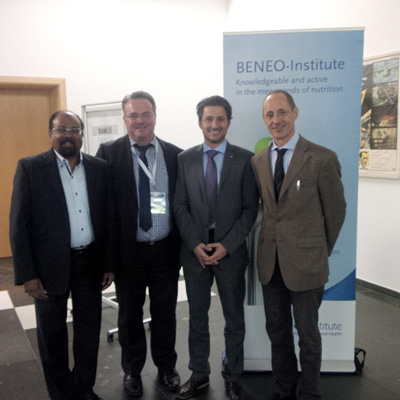Nutritionists discuss smart ingredients at the BENEO-Institute Symposium
- Like
- Digg
- Del
- Tumblr
- VKontakte
- Buffer
- Love This
- Odnoklassniki
- Meneame
- Blogger
- Amazon
- Yahoo Mail
- Gmail
- AOL
- Newsvine
- HackerNews
- Evernote
- MySpace
- Mail.ru
- Viadeo
- Line
- Comments
- Yummly
- SMS
- Viber
- Telegram
- Subscribe
- Skype
- Facebook Messenger
- Kakao
- LiveJournal
- Yammer
- Edgar
- Fintel
- Mix
- Instapaper
- Copy Link
Posted: 23 October 2015 | Victoria White | No comments yet
Studies discussed at the BENEO-Institute Symposium during FENS demonstrated how smart ingredients are opening new doors to balanced blood sugar levels…


At the recent 12th European Nutrition Conference (FENS), experts gathered from across the globe to discuss the importance of nutrition and health throughout a person’s life-cycle.


Pictured standing from left to right: Prof. Jeyakumar Henry, Stephan Theis Ph.D., Prof. Patrice D. Cani, Prof. Andreas Pfeiffer
During the conference, insights on recent scientific studies were delivered from leading experts at the BENEO-Institute Symposium. They demonstrated how smart ingredients are opening new doors to balanced blood sugar levels. Below is a selection of key comments made by speakers at the Symposium.
Professor Jeyakumar Henry, Director of Clinical Nutritional Science at Singapore Institute for Clinical Sciences, Singapore, spoke about the role of low glycaemic diets on physiological and metabolic outcomes: “Using experimental and clinical intervention studies, we have shown how carbohydrate rich foods can be reformulated to minimise glucose response in the human body. Scientists, clinicians, food manufacturers and consumers would all gain great benefits from understanding and selecting foods with a low glycaemic response, in their battle to reduce the risk of developing type 2 diabetes and obesity. Low glycaemic ingredients (e.g. isomaltulose, isomalt and dietary fibres) have been proven to be easily incorporated into final products, replacing high glycaemic carbohydrates.”
Speakers discussed isomaltulose, prebiotics and dietary fibres
Professor Patrice D. Cani, Louvain Drug Research Institute, Metabolism and Research, UCL, Belgium, discussed the merits of prebiotics in managing obesity: “Research has shown that gut bacteria are communicating with host cells and thereby contribute to the regulation of energy, glucose and lipid homeostasis. Prebiotic-induced change in the gut flora increases gut peptides involved in appetite regulation, glucose metabolism, energy homeostasis and gut barrier function. Hence, the prebiotics inulin and oligofructose have the potential to manage obesity and related metabolic disorders.”
Professor Andreas Pfeiffer, German Institute of Human Nutrition, Germany, who spoke on the metabolic benefits of Palatinose (isomaltulose) relating to gut hormone induced metabolic responses, said: “The research indicates that Palatinos, being fully available but slowly absorbed contrary to high glycaemic sugars, influences gut hormones like GIP (glucose-dependent insulinotropic peptide) and GLP-1 (glucagon-like peptide-1) that increases postprandial insulin sensitivity. This metabolic mechanism makes this new low glycaemic sugar very interesting particularly with the increasing type 2 diabetes situation in mind.”
The BENEO-Institute is an organisation which brings together BENEO’s expertise from Nutrition Science and Legislation teams. It acts as an advisory body for customers and partners reaching from ingredient approval, physiological effects and nutritional composition to communication and labelling. The key nutritional topics of the BENEO-Institute’s work include weight management, digestive health, bone health, physical and mental performance, the effects of a low glycaemic diet as well as dental health.









